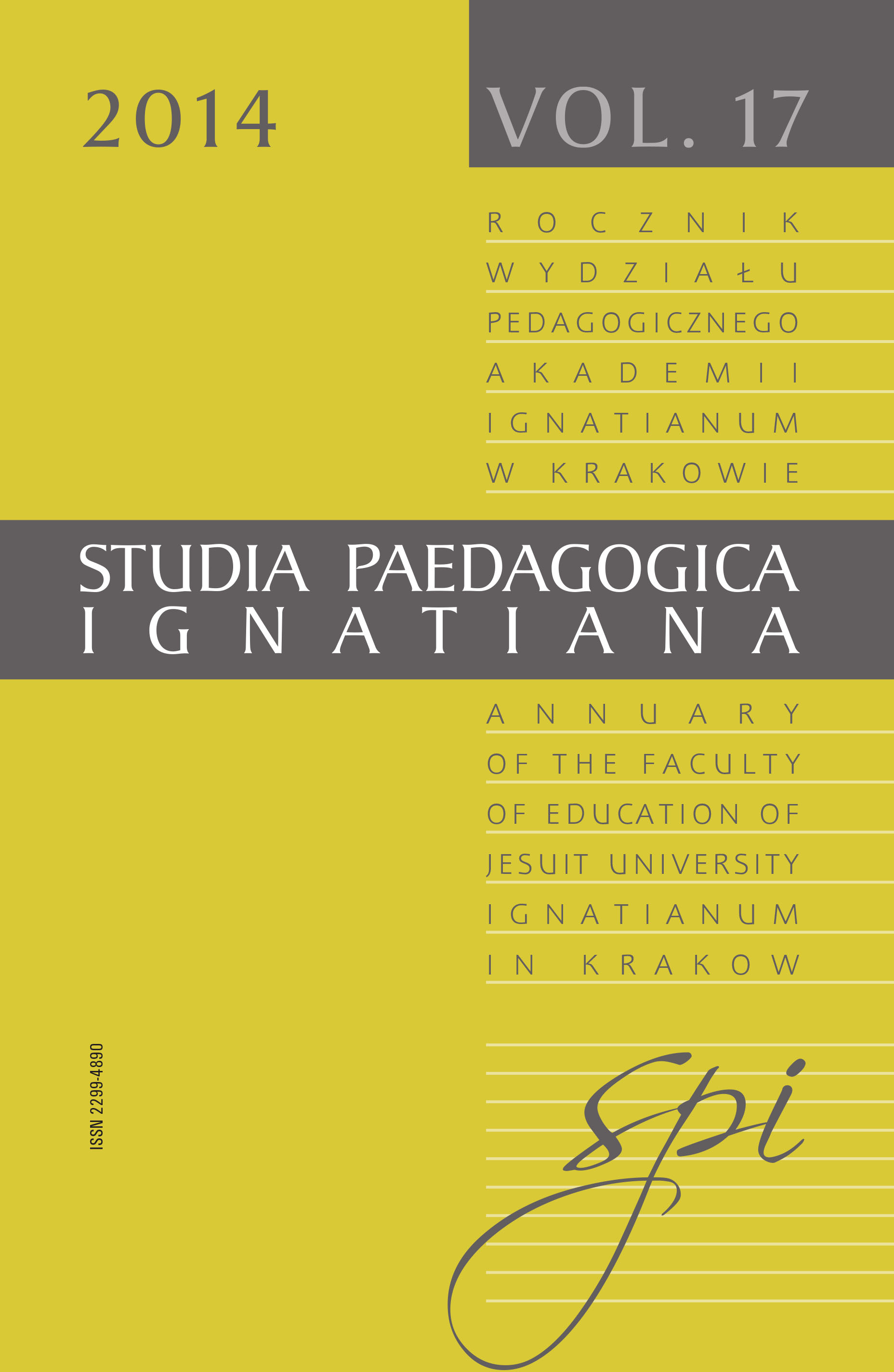O teorii „myśli słabej” w pedagogice humanistycznej
DOI:
https://doi.org/10.12775/SPI.2014.005Słowa kluczowe
Gianni Vattimo, myśl słaba, etyka interpretacji, hermeneutyka, dialektyka, filozofia różnicyAbstrakt
Artykuł dotyczy filozoficznej idei „myśli słabej” włoskiego filozofa postmodernistycznego, Gianniego Vattima, która może być traktowana jako sposób hermeneutycznej interpretacji faktów kulturowych, z edukacyjnymi włącznie. Słabą myśl charakteryzuje Vattimo na tle dwóch wielkich nurtów filozoficznych: dialektyki i filozofii różnicy. Jest to taki typ refleksji, który z jednej strony poszukuje dla siebie normatywnych punktów oparcia, z drugiej zaś przyznaje im prowizorycznystatus, pozbawiając się przywileju uniwersalistycznych roszczeń. Wspomniana koncepcja ukazuje związki między etyką i hermeneutyką, ze szczególnym uwzględnieniem etyki otwartej kontynuacji. Podkreśla ona również możliwość osłabienia kolonizującej mocy „mocnego” (nowoczesnego i naukowego) dyskursu w pedagogice. Do prawdy (prawdy pozbawionej metafizycznego gruntu) można również dotrzeć na drodze nienaukowej, która sprzeciwia się scjentyzmowi i wiedzie przez interpretację.
Bibliografia
Ablewicz K., Hermeneutyka i fenomenologia a pedagogika, w: Podstawy metodologii badań w pedagogice, red. S. Palka, Gdańskie Wydawnictwo Psychologiczne, Gdańsk 2010.
Dybel P., Problem dziejowości rozumienia w hermeneutyce Gadamera (na przykładzie pojęcia tradycji), w: Uniwersalny wymiar hermeneutyki, red. A. Przyłębski, Wydawnictwo Fundacji Humaniora, Poznań 1997.
Feyerabend P.K., Przeciw metodzie, przeł. S. Wiertlewski, Siedmioróg, Wrocław 1996.
Gadamer H.-G., Człowiek i język, w: Tenże, Rozum, słowo, dzieje. Szkice wybrane, wybór, oprac. i wstęp K. Michalski, przeł. M. Łukasiewicz, PIW, Warszawa 2000.
Gadamer H.-G., Prawda i metoda. Zarys hermeneutyki filozoficznej, przeł. B. Baran, „Inter Esse”, Kraków 1993.
Habermas J., Teoria działania komunikacyjnego, t. 1: Racjonalność działania a racjonalność społeczna, przeł. A.M. Kaniowski, Wydawnictwo Naukowe PWN, Warszawa 1999.
Habermas J., Uniwersalistyczne roszczenie hermeneutyki, przeł. M. Łukasiewicz, w: Współczesna myśl literaturoznawcza w Republice Federalnej Niemiec. Antologia, wybór, oprac. i wstęp H. Orłowski, „Czytelnik”, Warszawa 1986.
Hegel G.W.F., Fenomenologia ducha, przeł. A. Landman, PWN, Warszawa 1983.
Heidegger M., Czas światoobrazu, w: Tenże, Drogi lasu, przekł. zbiorowy, Fundacja „Aletheia”, Warszawa 1997.
Lorenc I., Świadomość i obraz. Studia z filozofii przedstawienia, „Scholar”, Warszawa 2001.
Milerski B., Paradygmat humanistyczny w pedagogice, w: Edukacja, moralność, sfera publiczna, red. J. Rutkowiak, D. Kubinowski, M. Nowak, Oficyna Wydawnicza „Verba”, Lublin 2007.
Nietzsche F., Zapiski o nihilizmie (z lat 1885–1889), przeł. G. Sowinski, w: Wokół nihilizmu, red. G. Sowinski, Wydawnictwo „A”: koed. „Colonel”, Kraków 2001.
Nussbaum M., Czytać aby żyć, przeł. A. Bielik-Robson, „Teksty Drugie” 2002, nr 1–2.
Nycz R., Tekstowy świat. Poststrukturakizm a wiedza o literaturze, Wydawnictwo IBL, Warszawa 1995.
Platon, Fajdros, w: Tenże, Dialogi, t. 2, przeł. oraz wstępami i objaśnieniami opatrzył W. Witwicki, „Antyk”, Kęty 1999.
Rorty R., Etyka zasad a etyka wrażliwości, przeł. A. Szahaj, „Teksty Drugie” 2002, nr 1–2.
Rorty R., Przygodność, ironia i solidarność, przeł. W.J. Popowski, Wydawnictwo Spacja, Warszawa 1996.
Rose D.E., The ethical claims of „Il pensiero debole”: Gianni Vattimo, pluralism and postmodern subjectivity, „Journal of Theoretical Humanities”, 2000, t. 7, nr 3.
Skarga B., Ślad i obecność, Wydawnictwo Naukowe PWN, Warszawa 2002.
Szahaj A., Ironia i miłość. Neopragmatyzm Richarda Rorty’ego w kontekście sporu o postmodernizm, FNP – Wydawnictwo UWr, Wrocław 2002.
Szulakiewicz M., Myślenie dialogiczne w poszukiwaniu nowej filozofii pierwszej, w: Dialog w kulturze, red. M. Szulakiewicz, Z. Karpus, Wydawnictwo UMK, Toruń 2003.
Vattimo G., Beyond Interpretation. The Meaning of Hermeneutics for Philosophy, Stanford University Press, Stanford 1997.
Vattimo G., Etica della interpretazione, Garzanti, Milano 2001.
Vattimo G., La fine della modernità, Garzanti, Milano 1991.
Vattimo G., La saggezza del superuomo, w: Tenże, Dialogo con Nietzsche. Saggi 1961–2000, Garzanti, Milano 2000.
Vattimo G., Dialektyka, różnica, myśl słaba, przeł. M. Surma, A. Zawadzki, „Teksty Drugie” 2003, nr 5.
Vattimo G., Etyka komunikacji czy etyka interpretacji, w: Tenże, Społeczeństwo przejrzyste, przeł. M. Kamińska, Wydawnictwo Naukowe Dolnośląskiej Szkoły Wyższej Edukacji TWP, Wrocław 2006.
Vattimo G., Hermeneutyka – nowa koiné, przeł. B. Stelmaszczyk, „Teksty Drugie” 1996, nr 1.
Vattimo G., Historia zbawienia, historia interpretacji, przeł. A. Zawadzki, „Teksty Drugie” 2005, nr 4.
Pobrania
Opublikowane
Jak cytować
Numer
Dział
Licencja
Autor zgłaszając swój artykuł oświadcza, że:
jest Autorem artykułu (zwanego dalej Utworem) i:
- przysługują mu wyłączne i nieograniczone prawa autorskie do Utworu,
- jest uprawniony/a do rozporządzania prawami autorskimi do Utworu.
Udziela Uniwersytetowi Ignatianum w Krakowie nieodpłatnej, niewyłącznej, nieograniczonej terytorialnie licencji do korzystania z Utworu na następujących polach eksploatacji:
- utrwalania utworu w formie papierowej, a także na nośniku cyfrowym lub magnetycznym;
- zwielokrotnienia utworu dowolną techniką, bez ograniczenia ilości wydań i liczby egzemplarzy;
- rozpowszechniania utworu i jego zwielokrotnionych egzemplarzy na jakimkolwiek nośniku, w tym wprowadzenia do obrotu, sprzedaży, użyczenia, najmu;
- wprowadzenia utworu do pamięci komputera;
- rozpowszechniania utworu w sieciach informatycznych, w tym w sieci Internet;
- publicznego wykonania, wystawienia, wyświetlenia, odtworzenia oraz nadawania i reemitowania, a także publicznego udostępniania utworu w taki sposób, aby każdy mógł mieć do niego dostęp w miejscu i czasie przez siebie wybranym;
- w zakresie praw zależnych do Utworu, obejmujących w szczególności prawo do dokonania koniecznych zmian w Utworze, wynikających z opracowania redakcyjnego i metodycznego, a także do dokonania tłumaczenia Utworu na języki obce.
Udzielenie licencji następuje z chwilą przekazania Utworu na rzecz Uniwersytetowi Ignatianum w Krakowie. Uniwersytet Ignatianum w Krakowie jest uprawniony do udzielania dalszych sublicencji do Utworu, w zakresie udzielonego prawa. Licencja jest ograniczona czasowo i zostaje udzielona na okres 15 lat, licząc od daty jej udzielenia.
Polityka prywatności
Statystyki
Liczba wyświetleń i pobrań: 656
Liczba cytowań: 0



